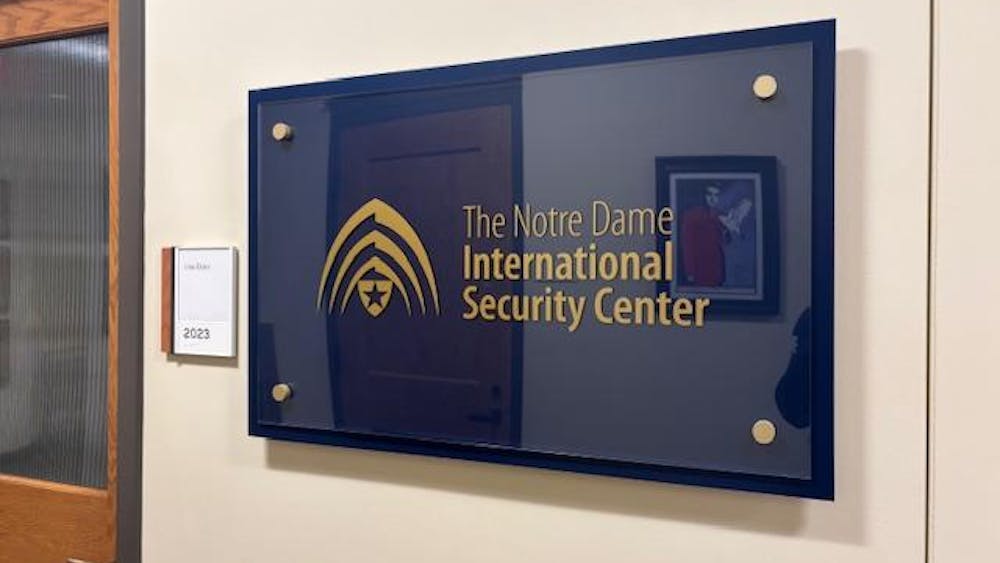Twelve books, 10,500 lines and plenty of sinful apples — all were consumed during this year’s Milton Marathon, an all-day reading of John Milton’s “Paradise Lost.”
On Saturday, students and faculty gathered in the Program of Liberal Studies’ third-floor lounge in O’Shaughnessy Hall to spend approximately 10 hours with the epic poem in blank verse. Participants took turns reading aloud the text, a 17th-century rendition of Adam and Eve’s temptation in the Garden of Eden.

Courtesy of Will Attig
Students pose with English professor Steve Fallon during Saturday’s Milton Marathon.
This weekend was not the first time students have canceled Saturday plans in lieu of intense reading. The event has transpired four times, but it had a brief hiatus because of COVID-19. The tradition made its post-pandemic return this year.
“Paradise Lost” was not chosen at random. One could assume its length would be a deterrent, but organizer Steve Fallon, an English professor, said duration is the reason to pick the poem.
“You have to give up a day, meaning it can be tiring,” Fallon said. “But there's something about doing something you would not otherwise do. I would sit down and read a shorter poem in one sitting, but it’s rare to sit down and read a poem of this length in one sitting.”
The challenge of endurance aside, Fallon considers the text not only the most regarded work of Milton, but one of the best texts ever written in the English language.
“I think as for most of us who are native English speakers, it's one of the great treasures of our language," Fallon said.
The poem is renowned for its excellence in any format, but students were particularly eager to hear it spoken out loud.
Sophomore Kat Regala remained at the event for 10 out of the 12 books. Even though she has had past exposure to the poem, Regala said this was her best encounter with the text.
“It was for sure engaging hearing people speak out the dialogue,” she said. “Everyone added good flare and it was great to listen to.”
Another student in attendance, sophomore Isaac Bernsten, felt the text brought to life by the reading.
“Even though I’ve already read the first 10 books prior to that, I was still underlining new things that I hadn’t picked up because I grasped a greater emotional insight into the states of the characters,” he said.
The endeavor was far from monotonous, Bernsten explained, as students put careful thought into the way that they read the poem.
“Nobody was truly shouting or anything like that or getting down on their knees or weeping with the characters,” Bernsten said. “But they were doing the inflections of questions and adding more force to certain words.”
A fan-favorite moment was in book nine during the Fall — the temptation of Adam and Eve by the serpent.
Students were given apples and instructed to make their first bite during the scene’s most important moment. The crunch of honeycrisps sounded when Eve bit into the apple, when Adam ate the fruit and even before or after these plot points.
“It’s just kind of funny seeing different people’s judgments as to the importance of what's the most grievous sin, when sin first comes about,” Bernsten said. “That was definitely the funniest part. It was very judgmental apple bites.”
The text, Regala added, was made more lively by the sounds of apple munching.
“It was super engaging in the fact that you could hear everyone eating the apple out loud,” she said.
The fact that students were willing to give up their Saturday to read the lengthy poem, Fallon said, reflects strongly on the character of the University’s students.
“Notre Dame students are very bright and enthusiastic and passionate about books,” he said. “Students have a close sort of intellectual social culture. So they like to be together, and they like to be together to share something beautiful.”
The dedication of the students, Regala explained, is evidence of a certain culture that persists on campus.
“I think it says a lot about Notre Dame in the fact that a bunch of students on a Saturday woke up early and were willing to take time out of their day to come and talk and engage in a very intellectual community,” she said. “Also just as a Catholic university, with everyone’s exposure to Genesis, I think that added an element of understanding and appreciation for the text.”
Bernsten thought that the event was more of a reflection on Fallon and other professors around campus.
“It demonstrates a certain love of beloved teachers,” he said. “It demonstrates, I guess, a certain amount of loyalty or a certain amount of gratitude that we feel towards teachers that impact us.”
As Fallon is retiring at the end of the semester, this year is the last time he will be hosting the event as a full-time professor.
Regala said Fallon will be missed in future years.
“He’s done this so many times and this is the last one,” Regala said. “A little part of me hopes that he’ll come back and lead events like this in the future. But yeah, it made it extra special.”
In his last go-around, Fallon reflected on what makes the Milton Marathon so special.
“It’s always exciting to see other people being animated by it and to realize that something written so long ago can be both so beautiful and moving and also remain relevant to their lives,” he said. “It’s always exciting to see especially young people excited about poetry in general and this poem in particular.”









